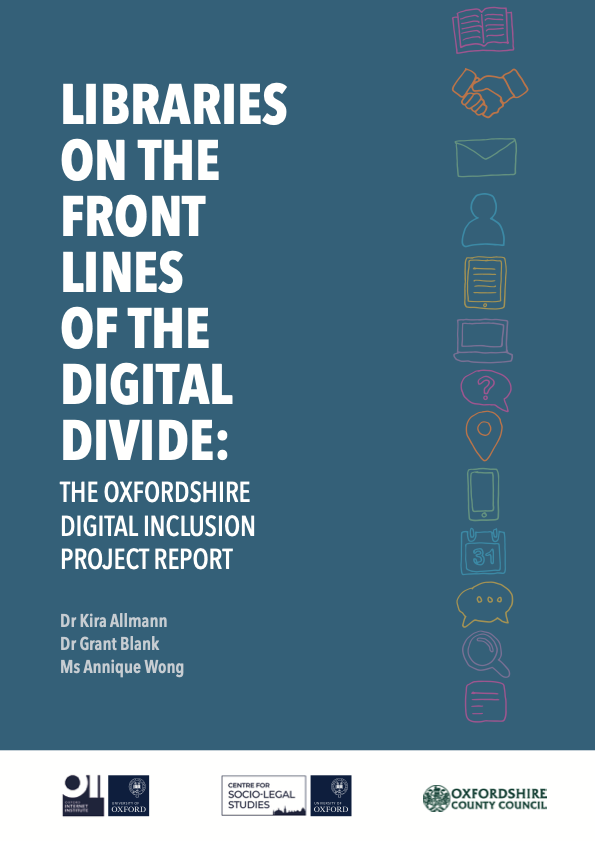The Oxfordshire Digital Inclusion Project Report
This report summarises findings from the 2020 Oxfordshire Digital Inclusion Project, which studied the digital assistance provided in Oxfordshire County Libraries. Public libraries are trusted, accessible community spaces that people rely on to cultivate relationships, exchange ideas, and learn. Today, libraries provide essential access to digital equipment, services, and skills training. They are vital bridges across the digital divide.
Libraries on the Front Lines of the Digital Divide: The Oxfordshire Digital Inclusion Project Report
Executive Summary
The impetus for this project grew out of observing the realities of the day-to-day digital offering in libraries. With more and more essential services going online, many people are turning to libraries to help them access e-government platforms, banking, and employment opportunities, among other daily activities.
This is a critical time to revisit and re-evaluate how to deliver digital inclusion and assess digital skills because we are entering an era of compulsory computing.3 People do not have a choice about whether to “go online” or not. Many employers accept only online job applications, and the government’s “digital by default” agenda means government services are increasingly accessible only online. As a result, people are compelled to use digital devices and the internet in order to participate in everyday life. This is a very different environment from the digital world that existed even a decade ago. In this context, governments should be obligated to ensure that citizens can access and understand the digital world while recognising the complexity and challenges of the digital world that people of all levels of digital fluency encounter today.
The UK Government’s digital strategies papers have consistently labelled public libraries as primary providers of digital access, training and support for local communities. But despite their prominence in public policy agendas, libraries are chronically under-resourced and under- appreciated sites of stop-gap digital help to people living in digital poverty. Staff reported spending up to 50% to 70% of their time addressing digital help requests. In the 2019-2020 year, digital helper volunteers provided over 800
hours of digital assistance in Oxfordshire Libraries, but library staff reported that this volunteer provision was not at all sufficient to meet the level of need.
In this report, we present findings from our research in the Oxfordshire County Libraries, focused on two themes:
(1) Exploring the day-to-day role libraries are playing in our digital world;
(2) Understanding the lived experience of digital exclusion, through observations and data on library computer users and digital help seekers.
Based on our findings about who uses libraries for digital needs and what libraries are doing to address those needs, we make several recommendations about how to better address digital exclusion and to enable libraries to fulfil the role they are already performing:
(1) There is a need to improve the digital skills of library staff, meaning that staff need to be digitally fluent themselves in order to address the high volume of digital help requests from customers;
(2) Government and local councils must recognise and support what libraries deliver with funding to hire more staff, acquire more hardware, and support a digital learning volunteer programme that can supplement staff expertise and time;
(3) We need to shift the focus of digital inclusion agendas from digital skills to digital wellbeing, meaning that any digital inclusion programme should be embedded in a wider social inclusion agenda because digital marginalisation is often bound up with other forms of social, economic, geographic, and educational marginalisation;
(4) Libraries must work to increase community outreach and awareness of the services they offer by reaching out to communities that might not know about their offerings, making libraries true community hubs for a diverse set of users.
Download the full report (PDF):
Thanks to Katy Dawkins for the report design (katydawkins.co.uk).


